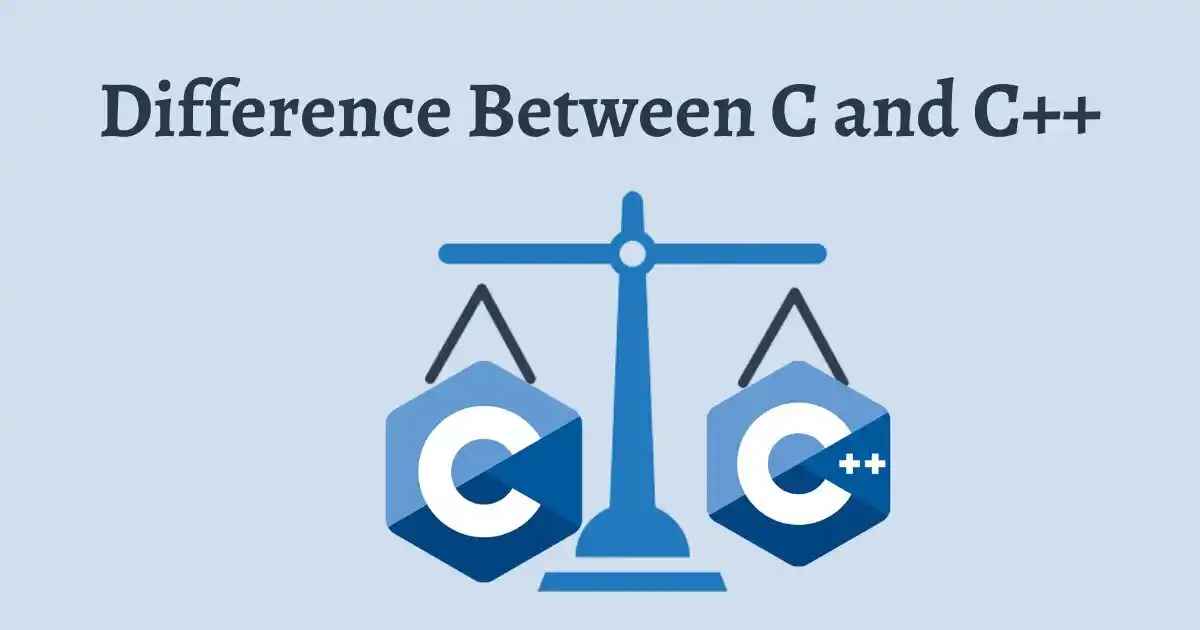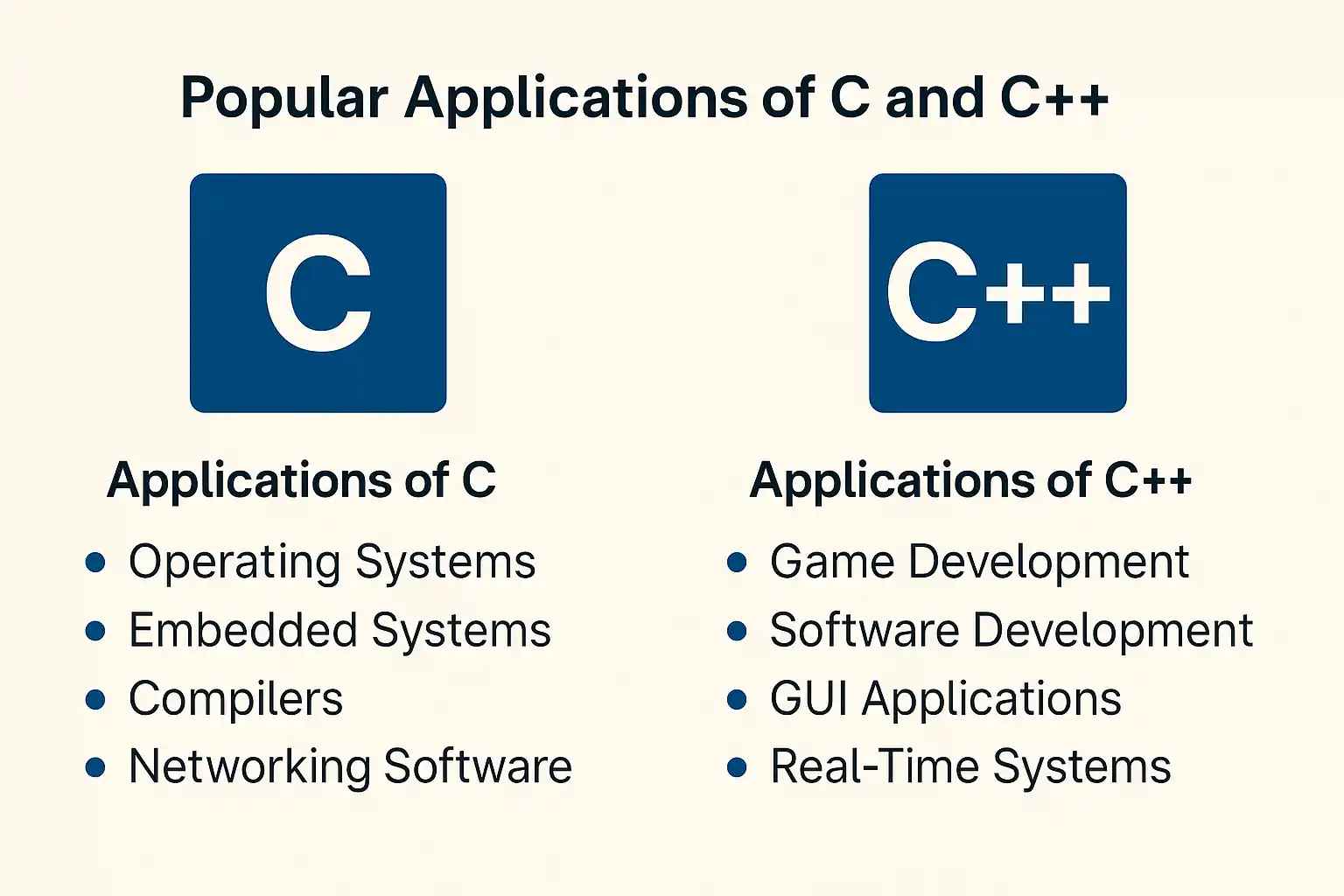Difference Between C and CPP: What Sets Them Apart
Updated on : 17 April 2025

Image Source: google.com
Table Of Contents
- 1. Introduction
- 2. C vs C++ Head-to-Head Comparison
- 3. What Is C
- 4. What Is C++?
- 5. What Is the Difference Between C and C++?
- 6. What Are the Similarities Between C and C++?
- 7. C vs C++: Pros and Cons
- 8. C++ vs C: Which One Should You Use?
- 9. Popular Applications of C and C++
- 10. Conclusion
- 11. FAQs
Table Of Contents
Introduction
C and C++ are foundational programming languages widely used in software development. Known for their efficiency and control over system resources, they serve as the backbone for many operating systems, game engines, and real-time systems.
C is procedural and focuses on structured programming.
C++ adds object-oriented features, enabling developers to build complex and scalable applications.
| Feature | C Language | C++ Language |
|---|---|---|
| Paradigm | Procedural | Procedural + OOP |
| Memory Access | Low-level (pointers) | Low-level + abstraction |
| OOP Support | No | Yes (Classes, Inheritance) |
| Strength | System programming | Flexibility, OOP support |
| Portability | High | High |
| Use Case | OS, embedded systems | Large software, games |
Got an innovative idea for a mobile app? Let’s turn it into reality with Hexadecimal Software!
Historical Background and Development
C Language:
- Originated in the 1970s at Bell Labs, C was derived from the B language and used in the development of the UNIX operating system.
- Its success and portability led to its widespread adoption and eventual standardization by ANSI in 1989 (ANSI C).
C++ Language:
- In the early 1980s, Bjarne Stroustrup enhanced C by adding features from Simula (the first OOP language), creating "C with Classes," which evolved into C++.
- It was standardized by ISO in 1998, with ongoing updates that continue to modernize the language.
C vs C++ Head-to-Head Comparison
| Feature | C | C++ |
|---|---|---|
| Programming Paradigm | Follows procedural approach | Supports procedural and OOP |
| Code Modularity | Modularity via functions | Modularity via classes and objects |
| Function Overloading | Doesn't support overloading | Supports function overloading |
| Default Arguments | Not allowed | Supported in functions |
| Classes & Objects | No support for OOP | Core concept of the language |
| Memory Management | Uses malloc() and free() | Uses new and delete with automation |
| Standard Library | Limited standard functions | Rich library with STL support |
| Input/Output | Uses printf() and scanf() | Uses cin and cout (type-safe) |
| Exception Handling | No built-in support | Supports try-catch blocks |
| Use Cases | Best for low-level programming | Great for large-scale applications |

Looking to integrate software solutions into your business?
What Is C?

Image Source: AI-generated
- C is a procedural programming language created by Dennis Ritchie in 1972.
- It’s one of the oldest programming languages and is considered the foundation of modern programming.
- C is widely used for system programming, writing operating systems, and embedded systems.
- It provides low-level access to memory, which makes it highly efficient for performance-critical applications.
Ready to streamline your development process? Let Hexadecimal Software power your DevOps journey!
Key Features of C:
-
Procedural language
-
Low-level memory manipulation
-
Efficient and fast execution
-
Used for system-level programming
What Is C++?

Image Source: AI-generated
- C++ is an extension of the C language created by Bjarne Stroustrup in 1979.
- While C++ retains the procedural programming paradigm of C, it also introduces object-oriented programming (OOP) features, including classes, inheritance, polymorphism, and encapsulation.
- This makes C++ more versatile and scalable for larger applications.
Key Features of C++:
-
Supports both procedural and object-oriented programming
-
Rich in features like classes, inheritance, and polymorphism
-
Better suited for large-scale application development
-
Memory management and system-level programming
What Is the Difference Between C and C++?
While C and C++ share similar syntax and low-level features, their paradigms differ significantly. Below is a detailed comparison of the key differences between C and C++:
| Feature | C | C++ |
|---|---|---|
| Programming Paradigm | Procedural Programming | Multi-paradigm (Procedural & Object-Oriented) |
| Support for OOP | No | Yes |
| Memory Management | Manual using pointers | Manual with features like RAII, smart pointers |
| Function Overloading | Not Supported | Supported |
| Data Abstraction | No | Yes (through classes) |
| Standard Template Library (STL) | Not available | Available |
| Namespace | No | Yes |
| Inheritance | No | Yes |
What Are the Similarities Between C and C++?
C and C++ have a lot in common since C++ is built as an extension of C. Here are some of their similarities:
| Similarity | C | C++ |
|---|---|---|
| Syntax | Similar to C++ | Similar to C |
| Low-Level Operations | Manual memory management | Manual memory management |
| Performance | High performance | High performance |
| Procedural Programming | Supported | Supported (as an option) |
C vs C++: Pros and Cons
C
Pros:
✅ Simplicity and ease of understanding
✅ Direct access to hardware and memory
✅ High performance and low overhead
✅ Rich library support for system-level programming
Cons:
❌ Lack of abstraction mechanisms
❌ No built-in support for OOP
❌ Memory management can be error-prone and difficult
C++
Pros:
✅ Object-Oriented features like inheritance, polymorphism, and encapsulation
✅ Better support for large projects and scalability
✅ Includes Standard Template Library (STL) for easier implementation of common algorithms and data structures
✅ Stronger memory management capabilities
Cons:
❌ More complex than C, especially for beginners
❌ Can have overhead due to abstraction layers
❌ Might be less efficient than C in certain scenarios due to OOP overhead
C++ vs C: Which One Should You Use?
| Criteria | C | C++ |
|---|---|---|
| Ease of Learning | ✅ Easier for beginners | ❌ More complex for beginners |
| Application Type | ✅ System-level programming, Embedded systems | ✅ Large-scale applications, Game development, Software requiring OOP |
| Performance | ✅ Generally faster | ❌ Can be slower due to object-oriented features |
| Use of OOP | ❌ Not supported | ✅ Highly recommended for large projects |
| Complexity | ✅ Less complex | ❌ More complex due to additional features like classes and polymorphism |
Got a massive data challenge? Let Hexadecimal Software unlock the power of Big Data for you!
Popular Applications of C and C++

Image Source: AI-generated
Applications of C:
-
Operating Systems: C is widely used for writing system-level programs, including operating systems (like UNIX) and device drivers.
-
Embedded Systems: C is frequently used in embedded systems programming where performance and memory control are crucial.
-
Compilers: Many compilers for other programming languages are written in C.
-
Networking Software: Low-level networking software often uses C for efficiency.
Applications of C++:
-
Game Development: Many game engines, including Unreal Engine, are written in C++ because of its ability to manage performance-intensive tasks.
-
Software Development: C++ is widely used in software development for large applications, where object-oriented programming is beneficial.
-
GUI Applications: C++ is used in building complex graphical user interface (GUI) applications like Adobe Photoshop.
-
Real-Time Systems: C++ is used in systems where real-time processing is crucial, such as telecommunications and robotics.

Got a stellar idea ready to turn into powerful software?
Conclusion
In conclusion, both C and C++ have distinct advantages and serve different purposes in the world of programming. If you're working on low-level systems or performance-critical applications, C might be the right choice. However, if you need to work on larger applications, especially those that benefit from object-oriented programming, C++ is more suited for the job.
Choosing the right language depends on your project requirements, complexity, and the trade-offs you're willing to make.
FAQs
Q.1. What is the main difference between C and C++?
A: C is a procedural language, while C++ supports both procedural and object-oriented programming (OOP).
Q.2. Which language is better for beginners, C or C++?
A: C is easier for beginners due to its simpler syntax and procedural nature.
Q.3. Can C++ be used to develop operating systems?
A: Yes, but C is more commonly used for operating systems due to its lower-level features.
Q.4. Is C faster than C++?
A: C is generally faster due to its simpler procedural structure, but C++ can be optimized for performance.
Q.5. Should I learn C or C++ first?
A: It’s better to start with C to understand the basics of programming and memory management.
Q.6. Is C++ backward compatible with C?
A: Yes, C++ can compile most C code, but C++ code is not always compatible with C.
Q.7. When should I use C++ over C?
A: Use C++ for larger projects requiring object-oriented features like classes and inheritance.
Q.8. Can I use C libraries in C++?
A: Yes, C libraries can be used in C++ with extern "C".
Q.9. What is the Standard Template Library (STL) in C++?
A: STL is a collection of template classes and functions that provide data structures and algorithms.
Q.10. Which language is more efficient, C or C++?
A: C is typically more efficient for low-level tasks, while C++ offers more advanced optimizations.
Q.11. Can I use C++ for web development?
A: C++ is not commonly used for web development, but it can be used for performance-critical backend tasks.
Q.12. What are the memory management differences between C and C++?
A: C uses malloc() and free(), while C++ supports new, delete, and smart pointers for better memory management.


